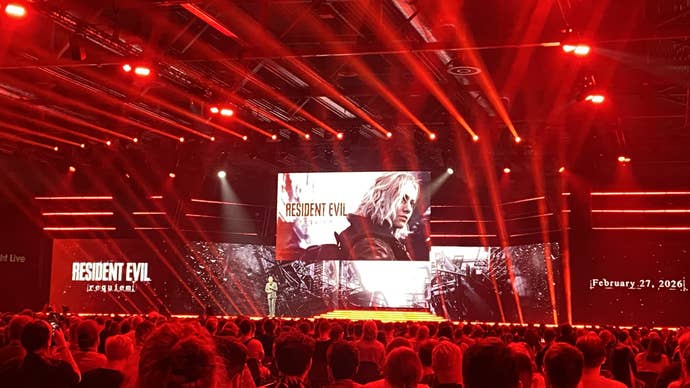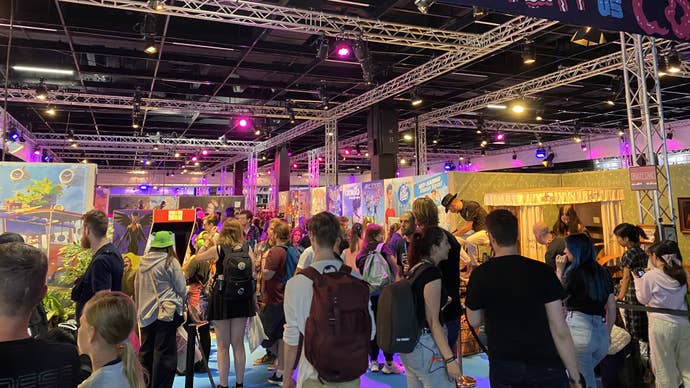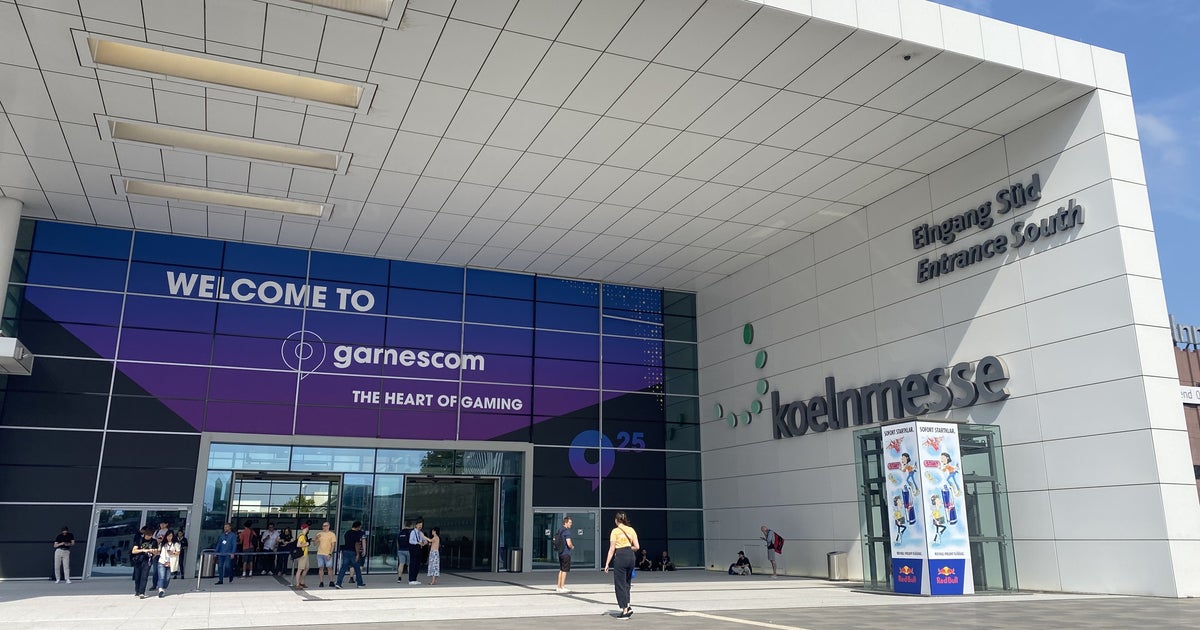“Gamescom has grown this year,” enthuses Tim Endres, the show’s director. “We are talking about more than 1,500 exhibitors. They’re coming from 72 countries, from all over the world. It’s more international than ever before.”
The Cologne-based gaming event has long been the biggest of its kind in the world, last year attracting 335,000 visitors. At the time of our interview, Endres is still waiting for final visitor numbers to come in for 2025, but he’s confident they might beat last year’s figure. “It looks pretty good.”
It’s not just about who’s physically on the show floor, though. Endres emphasises the importance of Gamescom Opening Night Live and Gamescom Studio, which is run with IGN and broadcasts highlights from the show worldwide. “So Gamescom is hybrid today,” he says – as much digital as it is physical.
It’s difficult to see how the physical side of Gamescom can grow, given that the show floor is already around the size of 30 football fields, taking up nearly the entirety of the forbiddingly huge Koelnmesse exhibition centre. But Gamescom has great potential to expand its digital presence.
Felix Falk, managing director of the German Games Industry Association (Game) and co-organiser of Gamescom, says he’s been happy to see “major growth” for Opening Night Live this year. “It’s early figures, but it looks like 30, 40, 50% plus right now for the increase in concurrent viewers.”

Given reports that trailers at the similarly Geoff Keighley-fronted Summer Games Fest can allegedly cost up to $550,000, we ask how much publishers have to pay for a slot on Opening Night Live.
The answer is nothing. “Of course, you can place some advertisements in Opening Night Live, but the vast majority of the content is free,” says Falk. “No matter if you’re a AAA title or indie, as long as your content is brilliant, Geoff will decide to put you in a show, and it doesn’t cost you a penny.”
There’s only one caveat. “Everyone who’s in the show has to be at Gamescom,” says Falk. “So a perfect fit is, for example, Lego Batman, where it was brand new, and the audience loved it, and they said, ‘Okay, tomorrow you can play it at the booth’.”
Endres adds that in terms of expanding digital reach, for the first time this year, Gamescom Studio is being localised for the Chinese and Japanese markets. He’s keen to see what the reaction to the content will be in China and Japan.
There’s also the Gamescom satellite shows: Gamescom Latam in Brazil and Gamescom Asia in Thailand. “We have great potential to grow in Sao Paulo and in Bangkok,” says Falk, “which we have already seen for Gamescom Latam, with 30% growth.”
But aside from merely growing, Endres says he wants to improve the quality of the Gamescom offering, including “the quality of our partners” and the quality of the experience for fans. “We want to fulfil their needs at Gamescom,” he says. “Growth is one aspect, but it’s not the only one.”
Building momentum
With the demise of E3, the importance of Gamescom in the industry calendar has only been increasing.
“Gamescom has always been the biggest festival in the world for gaming, no matter if there was any E3 or not,” says Falk. “Of course, now, without E3, it’s even more our responsibility to create the best stage for the whole industry.”
Endres says that the COVID pandemic was a crucial period for Gamescom, which was able to keep the momentum going throughout. “We took place in each year of the pandemic, we never lost contact [with] the community, the industry, and that was really important to bring us into pole position.”
“Purely digital showcases cannot replace a physical event like Gamescom”
Tim Endres, Gamescom
“It was a tough time,” adds Falk, “but we decided […] to invest really hard, to pay a lot of money to explore the hybrid world, and that gives us an even better position now.”
There was a time when people were questioning whether physical shows were even needed any more given the COVID-era domination of digital events. But Endres thinks the opposite proved true.
“I guess COVID was an absolute booster in terms of realising that we need physical events more than ever before,” he says.
“Purely digital showcases […] cannot replace a physical event like Gamescom, because people want to meet, people want to have emotional moments and interaction together with the games, with the community, and so on, and that’s what Gamescom is about.”
Politics in gaming
Falk says that for him, one of the highlights of Gamescom this year was the special slot in Opening Night Live that highlighted three games about engaging with democracy. “We had Jörg Friedrich, a member of ours, on stage, and he’s always done games around the Nazi regime and historical topics around democracy and the fight for democracy.”
Friedrich is the head of Paintbucket Games, creator of The Darkest Files, a game about investigating real Nazi crimes in post-Second World War Germany. He talked about the role that games can play in strengthening democracy.
“I found that really emotional,” says Falk. “I mean, that’s the beauty of our industry,” he adds, in which so many people are “positively trying to make the world a little better with games.”
Rather than shying away from putting politics in video games, he’s pleased to see games get more political.
“Well, that’s where I come from, I come from the political side,” says Falk, who previously worked at the Bundestag, the lower house of the German federal government. “So that’s also my view on the world. And I always say, games are political, no matter if you are planning to do it.”
“We are the most influential art form [at] the moment. We are the heart of pop culture, and this gives us a responsibility as an industry as well, to be political in a way. And even if we tried not to be, we still express beliefs, and we are influential on millions and billions of people worldwide.”

Of course, politics is also important outside gameplay, and Falk says that he has been pleased that the new German government is offering great support for the country’s gaming industry.
“Yesterday, for example, we had a roundtable with the highest CEOs, like Yves Guillemot and Sarah Bond and others, talking with the new minister to make Germany strong as a place for games – not just when it’s Gamescom in August, but the whole year.”
German politicians officially opened Gamescom on Wednesday. But is it difficult to get politicians engaged with gaming, we ask?
“It’s easy to get them here, and it’s easy to have them be blown away by this amazing festival and to see the potential,” says Falk.
“But what’s hard is to make them really understand what the industry needs are, and what we need to grow, and how fast this must be done – how fast the good surrounding on a political level needs to be built in order to be successful in the competition worldwide.”
“We are the heart of pop culture, and this gives us a responsibility as an industry”
Felix Falk, Game
He says the things the German games industry needs are similar to those elsewhere, such as better tax breaks. But the news is good for the German games market, which despite seeing a 6% drop in player spend in 2024, has recently reported 4% growth in the first half of 2025.
And Falk is pleased with the level of support from the government. “They just announced higher public subsidies here,” he says. “They just increased it from €50 million to €125 million for next year.”
It’s been a tough few years for the games industry. But it seems that in Germany – and for Gamescom – there are encouraging signs of growth.



